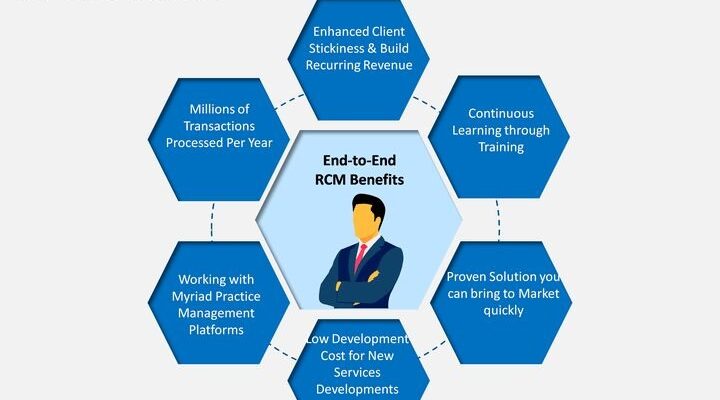
Introduction
In the ever-evolving landscape of healthcare, managing financial operations efficiently is crucial. This is where Revenue Cycle Management (RCM) comes into play. But what exactly is RCM, and why is it so important for healthcare providers? Let’s dive into the details.
Understanding Revenue Cycle Management
Definition and Overview
Revenue Cycle Management (RCM) refers to the financial process used by healthcare providers to track patient care episodes from registration and appointment scheduling to the final payment of a balance. Essentially, it encompasses all the administrative and clinical functions that contribute to the capture, management, and collection of patient service revenue.
Key Components of RCM
- Patient Registration and Scheduling: The initial step where patient information is collected and appointments are scheduled.
- Insurance Verification and Authorization: Ensuring that the patient’s insurance information is correct and services are authorized.
- Medical Coding and Billing: Translating healthcare services into standardized codes and generating bills.
- Claims Submission and Management: Submitting claims to insurance companies and managing denials.
- Payment Collections: Collecting payments from insurers and patients.
- Follow-Up and Appeals: Addressing denied claims and resubmitting them if necessary.
Challenges in Healthcare Revenue Cycle
Complexity of Billing and Coding
Billing and coding in healthcare are highly complex processes. Errors can lead to claim denials, delayed payments, and financial losses. The complexity is compounded by frequent changes in billing codes and regulations.
Regulatory Compliance
Healthcare providers must comply with numerous regulations, including those set by Medicare and Medicaid. Non-compliance can result in hefty fines and legal issues.
Patient Payment Collections
With the rise of high-deductible health plans, collecting payments from patients has become more challenging. Providers need effective strategies to manage patient balances and ensure timely payments.
The Need for Specialized RCM Services
Expertise and Experience
Specialized RCM services bring a wealth of expertise and experience. They understand the intricacies of medical billing and coding, reducing the risk of errors and improving efficiency.
Advanced Technology and Tools
These services leverage advanced technology and tools, such as automated billing systems and real-time analytics, to streamline the revenue cycle process.
Focus on Core Medical Services
By outsourcing RCM, healthcare providers can focus on their core services – providing quality patient care – rather than getting bogged down by administrative tasks.
Benefits of Specialized RCM Services
Improved Cash Flow
Specialized Revenue Cycle Management services help ensure that claims are submitted accurately and promptly, leading to quicker reimbursements and improved cash flow.
Enhanced Patient Satisfaction
Efficient RCM processes result in fewer billing errors and disputes, enhancing patient satisfaction and trust.
Better Compliance and Reduced Errors
With their in-depth knowledge of healthcare regulations, specialized RCM services help ensure compliance and reduce the risk of costly errors.
Cost-Effectiveness of Specialized RCM Services
Reducing Operational Costs
Outsourcing RCM can reduce the need for in-house administrative staff and resources, cutting operational costs.
Maximizing Revenue Opportunities
Specialized services can identify revenue opportunities that might be missed by in-house teams, such as undercoded procedures or overlooked claims.
Key Features of Effective RCM Services
Real-Time Data Analytics
Effective RCM services utilize real-time data analytics to monitor and improve the revenue cycle continuously.
Automated Billing Processes
Automation reduces manual errors and speeds up the billing process, ensuring timely claims submission.
Comprehensive Reporting
Detailed reporting provides insights into the revenue cycle, helping healthcare providers make informed decisions.
Selecting the Right RCM Partner
Evaluating Expertise and Track Record
Look for a partner with a proven track record and expertise in your specific area of healthcare.
Assessing Technology and Innovation
Ensure that the RCM service uses cutting-edge technology and innovative solutions to enhance efficiency.
Understanding Service Scope and Customization
Choose a partner that offers customizable services tailored to your specific needs and challenges.
Implementation of RCM Services
Transition Process
A smooth transition is essential. This includes data migration, setting up systems, and ensuring continuity of operations.
Staff Training and Support
Provide adequate training and support to your staff to ensure they are comfortable with the new processes and tools.
Case Studies and Success Stories
Example 1: Small Clinic Transformation
A small clinic struggling with billing errors and delayed payments saw a significant improvement in cash flow and efficiency after implementing specialized RCM services.
Example 2: Large Hospital Efficiency Boost
A large hospital reduced claim denials and improved compliance, resulting in increased revenue and patient satisfaction.
Common Misconceptions about RCM Services
Myth: High Costs
Many believe that RCM services are expensive, but they often save money in the long run by reducing errors and improving efficiency.
Myth: Loss of Control
Healthcare providers worry about losing control over their billing processes, but good RCM services offer transparency and regular updates.
Myth: Only for Large Organizations
RCM services are beneficial for healthcare providers of all sizes, from small clinics to large hospitals.
Future Trends in Healthcare RCM
AI and Machine Learning Integration
Artificial Intelligence and Machine Learning are transforming RCM, offering predictive analytics and automated processes.
Telehealth and RCM
With the rise of telehealth, RCM services are adapting to manage virtual care billing and reimbursement.
Patient-Centric RCM Solutions
Future RCM solutions will focus more on enhancing the patient experience, making billing processes more transparent and patient-friendly.
How to Measure the Success of RCM Services
Key Performance Indicators (KPIs)
Monitor KPIs such as claim denial rates, days in accounts receivable, and patient satisfaction to measure success.
Regular Audits and Assessments
Conduct regular audits and assessments to identify areas for improvement and ensure compliance.
Conclusion
In conclusion, specialized Revenue Cycle Management services are essential for healthcare providers looking to improve efficiency, compliance, and patient satisfaction. By leveraging expertise, advanced technology, and tailored solutions, these services help providers navigate the complexities of the healthcare revenue cycle effectively.











